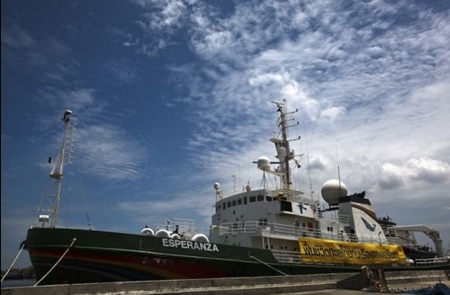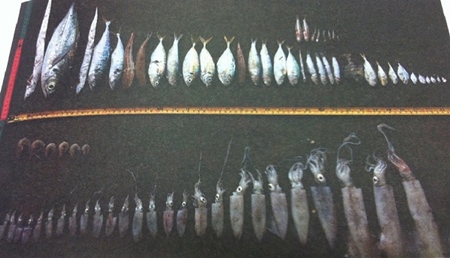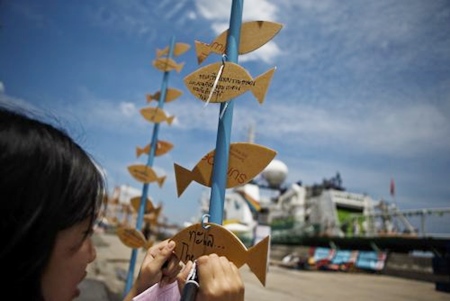BANGKOK, June 27 – The Greenpeace vessel Esperanza is now docked in Bangkok’s Klong Toey Port to promote the environmental NGO’s campaign to stop destructive overfishing in Thailand.
The independent global campaigning organisation launched a report today on the “Ocean in the Balance: Thailand in Focus”, presenting shocking evidence of destructive fishing operations in the Gulf of Thailand.

The Esperanza has been in Thailand since June 15, working with coastal communities and civil society groups in Songkhla and Prachuap Khiri Khan to call for stronger fisheries laws in order to save the Gulf of Thailand.

“We saw first-hand how hundreds of commercial fishing boats were operating in the Gulf of Thailand, emptying everything in their path with fishing methods that destroy the marine environment. If this continues, our oceans will be barren perhaps for a decade.

Photo by Greenpeace: Immature marine life caught in a small mesh net
“The Thai government must stop it with stronger laws and enforcement,“ said Sirasa Kantaratanakul, Oceans Campaigner for Greenpeace Southeast Asia.
When witnessing illegal fishing, she said the group reported the actions to the authorities but the culprits could not be arrested as the law required the arrest to be done while the illegal action is being carried out. When the authorities come to the scene, they have already escaped.
Greenpeace activists also documented the massive extent of destructive large scale commercial fishing operations and submitted their findings to representatives of the Fisheries Department at Thursday’s press conference.

Some fishing activities were seen in areas off-limits to commercial fishing such as the Ang Thong Marine National Park.
The report notes that average fishing operations would yield 300 kg per hour in 1961 but by 2011, it dropped to only approximately 25 kg per hour, demonstrating the degree of depletion that has taken place.
Greenpeace is asking the Thai government to stop destructive fishing such as using bottom trawlers, push nets, clam dredges and light luring, and to expand the coastal fisheries protected zones to five nautical miles and to 12 nautical miles where needed.
Bottom trawling uses weighted nets that are dragged along the sea floor, catching all marine life including turtles and immature fish from the bottom to the top of the net, especially when used with the small mesh net sizes.
Greenpeace also called for the enforcement of large mesh sizes and fishing tools to catch only mature marine animals and the stop of dirty development and unchecked construction along coastlines recognised as having rich biodiversity and sensitive areas.
The Esperanza will end her tour in Bangkok on Sunday and will sail to the Philippines.




